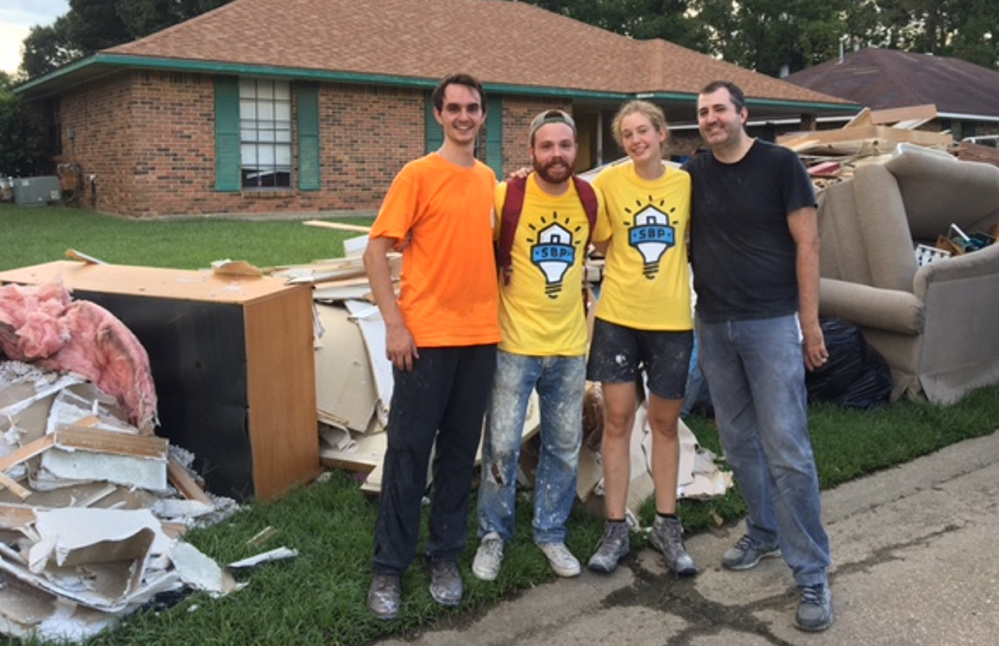James McCullum says he’s always had a great desire to help people in any way he can. Since graduating from college last year, he has volunteered for a global disaster relief organization.
McCullum, who grew up in Hallowell and graduated from Hall-Dale High School in 2010, recently returned from a trip to Baton Rouge, Louisiana, where he helped in the cleanup and rebuilding of the city after last month’s historic flooding that killed 13 and damaged nearly 150,000 homes.
“The media likes a big, catchy headline and story like a hurricane or another big disaster,” McCullum said by phone Friday from Albany, New York, where he is taking classes before applying to medical school. “This was just a lot of rain, and I don’t think it got the attention it deserved.”
McCullum, 24, volunteers with the Maryland-based Ananda Marga Universal Relief Team, or AMURT, which has been aiding with disaster relief around the world since it was founded in India in 1965. The organization sent out a call for service to thousands after the Louisiana flooding, and McCullum was the first to respond, so he was the first relief team volunteer on the ground in Baton Rouge.
“For some reason, though, we didn’t respond very quickly, to be honest, and I don’t know why,” he said. McCullum arrived in Louisiana more than a week after the rain ended and several days after thousands of people’s lives were changed forever.
After a flight from Boston to New Orleans, he connected with the St. Bernard Project, a nonprofit organization started in 2006 after Hurricane Katrina.The St. Bernard organizers told him they had been gutting homes damaged by the flooding and needed all the help they could get.
Throughout his first day, McCullum drove around “neighborhoods the size of Hallowell that had home after home with everything on the lawn.” He saw empty houses with lawns littered with Sheetrock, couches, beds, food, carpet, insulation and anything else that got wet from the floodwaters.
McCullum spent about four hours with people from St. Bernard gutting one home, and he said that the heat and humidity made the work slow going.
“The streets had a terrible smell, and the piles of trash were like enormous snowbanks from my childhood days in Maine,” he said.
He visited a Federal Emergency Management Agency relief camp in East Baton Rouge. He said there were hundreds of people applying for FEMA assistance, though he wasn’t sure how many would receive help because many of the hardest-hit areas weren’t in flood zones and the homes didn’t have flood insurance.
“It wasn’t just lower-income areas that were affected,” McCullum said. “There were middle class homes, really nice houses, that were severely impacted.”
The next day, McCullum volunteered at the River Center, a downtown arena being used as a shelter run by the Louisiana Department of Children and Family Services with help from the Red Cross.
“Listening to people tell their stories was extremely difficult,” McCullum said. “I was physically and emotionally exhausted, and trying to be there for these people was hard.”
McCullum said he heard from families who had lost everything, and he was especially moved by a mother who said she didn’t even have shoes for her kids. But his experience talking to those affected by the flooding wasn’t all negative.
“There were so many people volunteering, and the strength of the community coming together was what you’d hope to see after something like this,” he said. “People were coming together and putting forth a lot of effort to help.”
McCullum said the three-day trip probably cost around $500, though he said you can’t put a price on the help he was able to give for a few days. He hopes this gets more attention because the recovery is going to take at least several months.
“These are our fellow human beings, and they need our help,” McCullum said. “And who knows, one day it may be us asking for help from others.”
McCullum graduated with a degree in geology from Washington and Lee University in Virginia and has made several international trips to offer help. He’s been to Peru and Ecuador and to parts of Asia and realized that he really values relationships with people.
He decided he didn’t want to continue studying rocks and soil, so McCullum, who lives in Albany with his brother, is taking community college classes as prerequisites for attending medical school sometime in the next two years.
Ideally, he’ll take the Medical College Admission Test next summer and apply to medical school in the fall. He would like to attend the University of New England in Biddeford because of its osteopathic medicine program.
“I think it’d be so cool to come back to Maine,” McCullum said. “I left for a few years and would come back and be reborn here.” He has an interest in rural and family medicine, but he also didn’t rule out volunteering for a program such as Doctors Without Borders, which provides medical care in more than 70 countries.
“I want to use the resources I have to touch more people and at least give them love and understanding,” he said.
Send questions/comments to the editors.




Comments are no longer available on this story